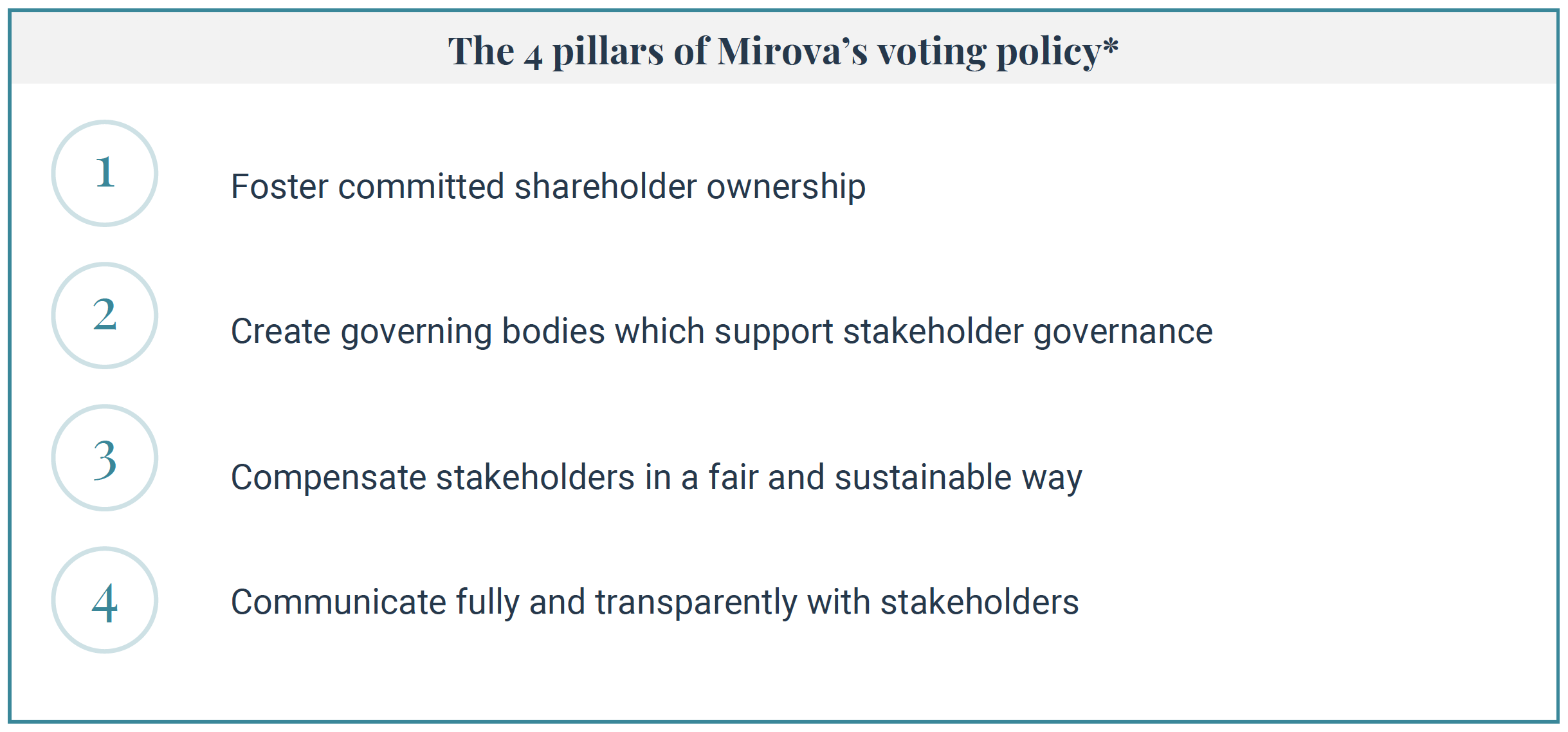The G Factor
Today’s world is changing, led by long term transitions: demographic, technological, environmental and related to corporate governance. In this interview, Amber Fairbanks and Manon Salomez give their view on the impact of Covid-19 on corporate governance, and share Mirova’s vision, putting the emphasis on the creation of shared value over the long term.
At a glance
- We don’t believe that the pandemic was an inflection point for corporate governance, but it clearly accelerated a pre-existing and necessary corporate transition towards a fairer capitalism.
- Advocating stakeholders’ value and not just shareholder value has always been at the core of Mirova’s vision, and thus since inception in 2014.
- In order to ensure we invest in companies sharing our vision of sustainable corporate governance, we try to use as many tools as we find relevant, including a robust voting and engagement policy.
Do you believe the current crisis is an inflection point for corporate governance?
First, we think it is important to highlight that, while governance can generally be defined as a system of entities that governs an area of activity, the term is frequently used to describe different realities. The development of responsible investment is closely linked to the consideration of ESG1 criteria. While the SDGs2 are intended to comprehensively address environmental and social issues, they only partially address governance issues. That said, good governance is central to the delivery of sustainable development at companies’ level: a well-functioning board with a good representation of companies’ stakeholders, robust internal controls, and executive remuneration that integrates environmental and social issues into business practice are key to ensuring that companies deliver a positive impact on society. We believe good governance of public institutions is equally necessary to deliver wellbeing for citizens.
In 2020, as the pandemic occurred, the scrutiny on corporations needed to think through their stakeholders and their broader impact on society and the planet has heavily increased. As such, we wouldn’t say that the pandemic was an inflection point for corporate governance, but we believe it clearly accelerated a pre-existing and necessary corporate transition towards a fairer capitalism. Fortunately, companies had started to question their business model and the way they interact with suppliers, contractors, customers and communities before the various lockdowns and economic turbulences.
In other words, the discussion on how the G-factor could play a role in transforming the society and the environment was already initiated.
How so?
For example, back in 2019, the Business Roundtable, a group of 250 CEOs of large US companies announced that they no longer would prioritize shareholder value, but that their companies, by embracing sustainable practices across their businesses, should support the communities in which they work and protect the environment.
Yet, we feel the pandemic has been a major upheaval for us all, as individuals, citizens, companies, and investors. It severely impacted global public health, as well as our economies and societies. Companies had to face many challenges, having to handle day-to-day operations while protecting the health and financial security of their employees. Since the beginning of the pandemic, we witnessed companies adopting short-term measures such as paid leave, donations to hospitals, employees’ bonuses, extension of payment terms for suppliers to support their stakeholders. Nevertheless, the transition towards a fairer capitalism will be supported by longer-term measures, such as favoring a better representation of employees within the board or include sustainable development criteria in top management’s compensation.
How do you support the transition towards fairer capitalism at Mirova?
At Mirova, in 2020, we encouraged the companies we engage with to be cautious when it came to dividends distribution, but also to maintain employment, prioritize health and safety, and maintain supplier/customer relationship.
Advocating stakeholders’ value and not just shareholder value has always been at the core of Mirova’s vision, and thus since inception in 2014.
This long-term approach of responsible capitalism has even been embedded by our recent recognition as a B-Corp3 and mission-led company4. At the end of the day, we aim at investing in companies that not only are delivering solutions to the sustainable development goals, but also integrating sustainability in their corporate governance. As a responsible investor, we seek to have the largest positive impact possible in promoting the development of a corporate vision focused on the creation of shared value over the long term.
As investors, we believe companies aligning sustainably will lead to a positive, long-term value creation that benefits both shareholders and the broader stakeholder community.
What are the levers to encourage changes in corporate governance?
In order to ensure we invest in companies sharing our vision of sustainable corporate governance, we try to use as many tools as we have available. We actively engage with companies, in order to create an environment conducive to responsible investment. In that regard, we encourage companies to adopt objectives which are in line with the UN Sustainable Development Goals (SDGs), but also to improve transparency in relation to their sustainability efforts and their overall practices: for example, by developing solutions for ESG issues.
We also send the companies engagement priorities each year, alongside focusing on mitigating climate change or preserving biodiversity, we highlight our expectations regarding the integration of sustainability at the core of their governance and demonstrating enhanced transparency on sustainability impacts. We also focus on reducing inequalities (shared value creation, gender diversity). Last, but not least, we encourage shareholders to promote our vision of what a company should be through our voting policy, based on 4 main pillars.

*For more information about our voting policy, please refer to the following document: Voting Policy Governance for Sustainable Development
For more information on our methodologies, please refer to our 'Research' section.
1 - Environment, Social, Governance
2 - Sustainable Development Goals
3 - For more information: www.bcorporation.net/about-b-corps
4 - For more information: www.entrepriseamission.com
CFA® and Chartered Financial Analyst® are registered trademarks owned by the CFA Institute.
Mirova US is a U.S.- based investment advisor that is a, wholly owned affiliate of Mirova. Mirova is operated in the U.S. through Mirova US. Mirova US and Mirova entered into an agreement whereby Mirova provides Mirova US investment and research expertise, which Mirova US then combines with its own expertise when providing advice to clients.
The information provided reflects Mirova’s opinion as of the date of this document and is subject to change without notice.

As Joe Biden prepared for the inauguration, he tweeted "It’s a new day in America". And what a day! Hours after taking the presidential oath, Biden announced that the United-States would rejoin the Paris Climate Agreement as promised during his electoral campaign (in essence the starting of a new climate era in the U.S. and the global race to a net zero economy).

Investing in Sustainability? Yes but how Learn about what happened at Mirova during Q1 2021.

Understanding the markets, Investing, Engaging in dialogues, Measuring Impact... Read the new issue of Mirovα: Creating Sustainable Value


